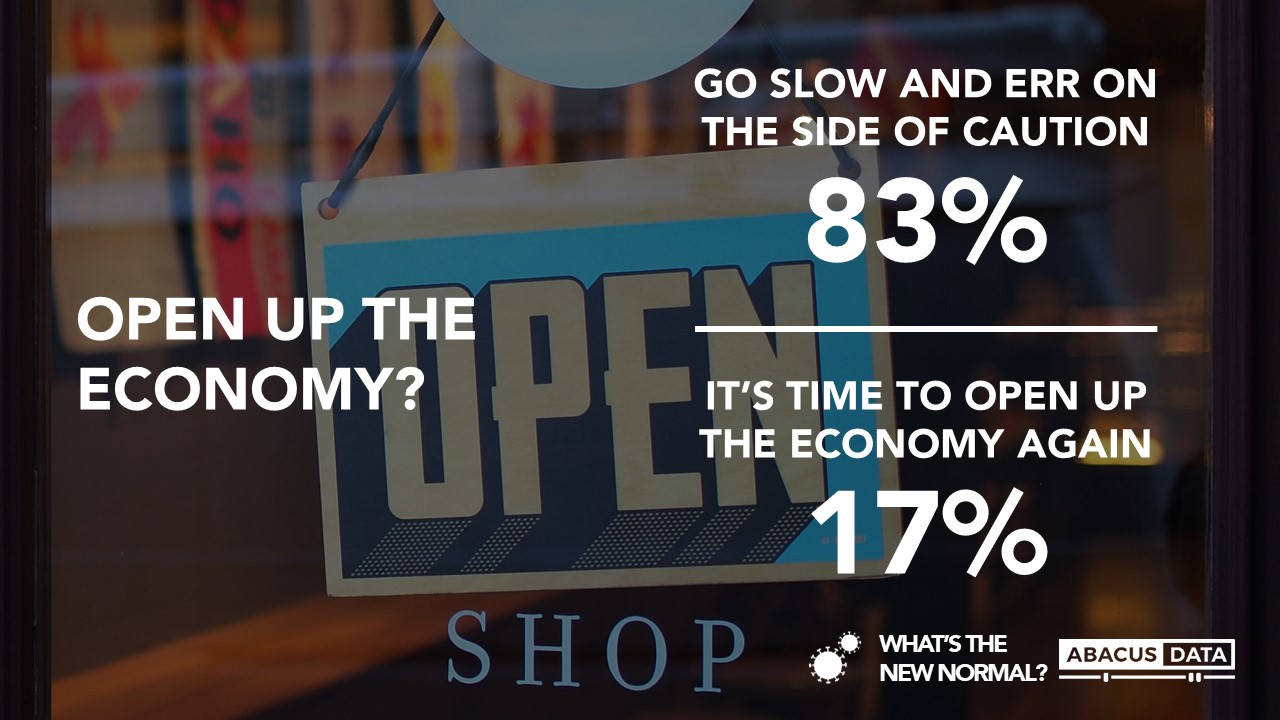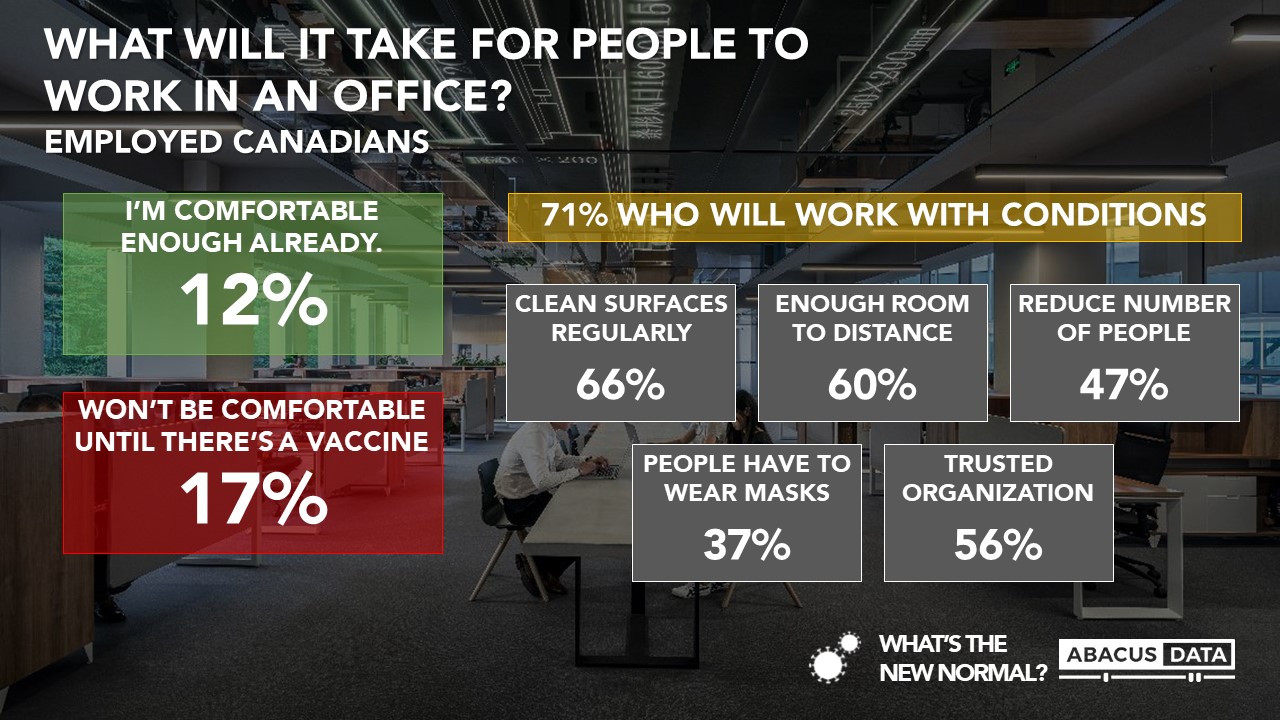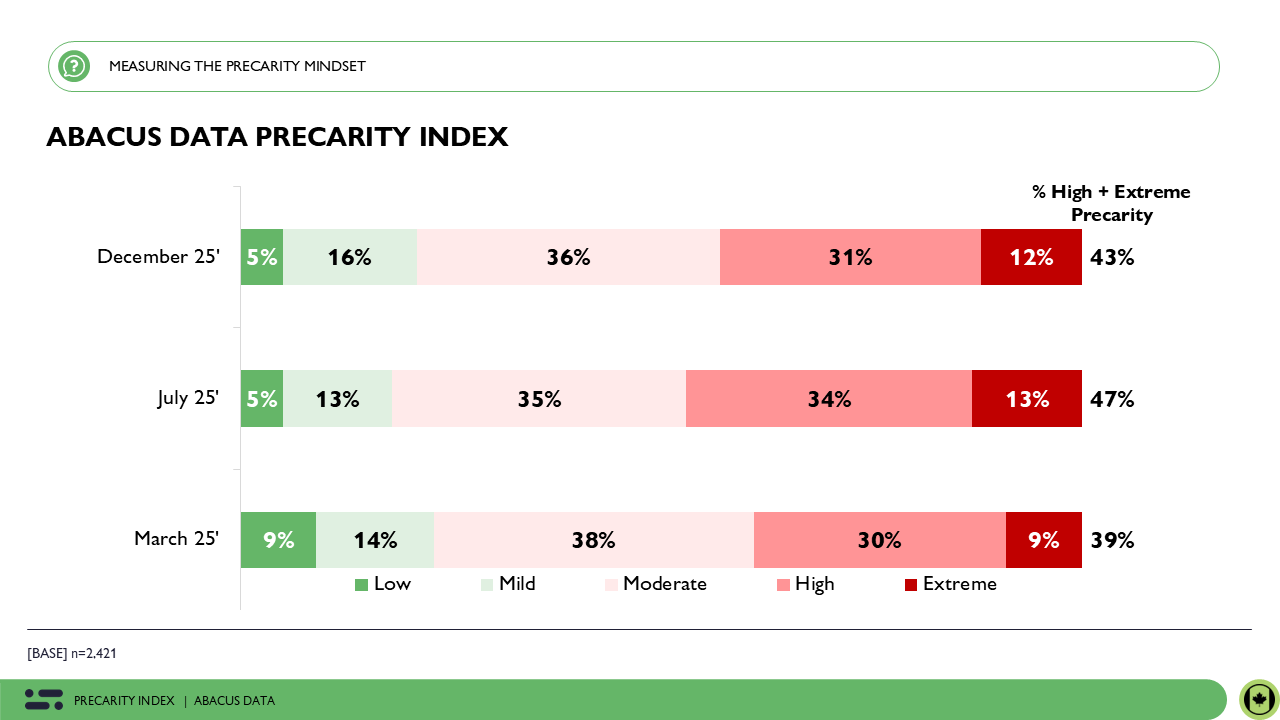When the economy “re-opens”, what will it take for people to come back in?
May 6, 2020

Abacus Data Bulletins are short analyses of public opinion data we collect. For more information or media interviews, contact David Coletto.
Our team has been tracking Canadian perceptions and attitudes around the pandemic for almost two months. As provinces start executing plans to re-open the economy, one question many are asking is: will people re-enter the economy after it re-opens?
But just because the economy is “re-open”, doesn’t mean people will feel comfortable doing the things they used to, including shopping, travelling, and working.
At the end of April, we found that 83% of Canadians wanted policymakers to go slow and err on the side of caution when making plans to re-open the economy and that concern about getting the virus was still a primary driver for overall worry about the pandemic. While people are anxious about the economic impact of the pandemic, their personal health and safety remain paramount to the decisions they will make.

Given this, in our most recent survey, I wanted to better understand what it might take, if anything, to help people feel comfortable returning to some previous behaviours. We explored several scenarios, but I’m sharing four today: shopping in a mall, working in an office, taking public transit, and going to a sit-down restaurant.
SHOPPING IN A MALL
Malls, like other businesses that require “mass” traffic and volume, will face big challenges responding in a post-COVID world. For up to 8 weeks, the once safe and familiar shopping malls and centres across the country have been closed.
As malls re-open, what should they do to make consumers come back?
7% of those currently employed say they are comfortable enough all ready to go back to a mall.
But 1 in 4(26%) say they won’t be comfortable shopping at a mall until there’s a vaccine.
For the remaining 66% who have some conditions, 72% want surfaces to be cleaned regularly, 73% want there to be enough room to distance themselves from others, while 57% want to see a reduced number of people allowed into a mall. 43% want to see mandatory facemasks.

WORKING IN AN OFFICE
Within a very short period of time, millions of Canadians transitioned from working in an office to working from home. In one survey we did, 20% of Canadians (1 in 5) said they were now working from home.
As the economy re-opens and employers think about how to re-open their office, what do employees want?
12% of those currently employed say they are comfortable enough all ready to go back to an office.
But almost 1 in 5 (17%) say they won’t be comfortable going back to an office until there’s a vaccine.
For the remaining 71% who have some conditions, 66% want surfaces to be cleaned regularly, 60% want there to be enough room to distance themselves from others, while 47% want to see a reduced number of people allowed into the office. 37% want to see mandatory facemasks.

TAKING PUBLIC TRANSIT
Use of public transit across the country has crashed as people stopped working, worked from home, or felt uncomfortable taking public transit.
As the economy re-opens and people start heading back to work, what will get regular transit users back on buses, streetcars, and subways?
7% of regular transit users say they are comfortable already taking public transit.
But almost 1 in 4 (24%) say they won’t be comfortable until there’s a vaccine.
For the remaining 69% who have some conditions, 68% want surfaces to be cleaned regularly, 63% want there to be enough room to distance themselves from others, while 62% want to see maximum capacity reduced. 51% want to see mandatory facemasks.

GOING TO A RESTAURANT
As restaurants closed their dining rooms during the pandemic, millions of foodies across Canada (35% of Canadians identify as foodies), anxiously waited to get back into some of their favourite restaurants.
As the economy re-opens and people start thinking about going to their favourite food spots, what will make them feel comfortable?
7% of consumers say they are comfortable already going to a sit-down restaurant.
But 3 in 10 (30%) say they won’t be comfortable until there’s a vaccine.
For the remaining 63% who have some conditions, 76% want surfaces to be cleaned regularly, 71% want there to be enough room to distance themselves from others, while 66% want to see maximum capacity reduced. Only 21% want to see mandatory facemasks, although that will be hard when trying to eat.

THE UPSHOT
We are entering a new phase of the pandemic. The reset. The emergence. Will consumers stick their toe in or dive in?
But just because the economy is re-opening doesn’t mean people will feel comfortable in it. Businesses will need to reassure wary customers that they are following best practices and safety protocols. Organizational trust and reputations will be more important than ever.
Some will only feel comfortable returning when a vaccine is available. For others, it will require decreased capacity, vigilant cleaning regimes, and in some cases, mandatory facemasks.
Consumers and workers want to get out of their homes. For eight weeks, they have all become accustomed to the safety and familiarity of their homes. Stepping out in the unknown requires confidence, trust, and new procedures to make them feel secure.
Research can help confirm or reject assumptions and keep the customer/employee voice in your decision making. As we say at Abacus, good decisions require good data.
ABOUT ABACUS DATA
We are the only research and strategy firm that helps organizations respond to the disruptive risks and opportunities in a world where demographics and technology are changing more quickly than ever.
Find out more about what we are doing to help clients respond to the COVID-19 pandemic.
We are an innovative, fast-growing public opinion and marketing research consultancy. We use the latest technology, sound science, and deep experience to generate top-flight research-based advice to our clients. We offer global research capacity with a strong focus on customer service, attention to detail and exceptional value.
We were one of the most accurate pollsters conducting research during the 2019 Canadian Election.

Contact us with any questions.
Find out more about how we can help your organization by downloading our corporate profile and service offering.
METHODOLOGY
Our survey was conducted online with 1,100 Canadians aged 18 and over from May 1 to 5, 2020. A random sample of panellists was invited to complete the survey from a set of partner panels based on the Lucid exchange platform. These partners are double opt-in survey panels, blended to manage out potential skews in the data from a single source.
The margin of error for a comparable probability-based random sample of the same size is +/- 2.3%, 19 times out of 20. The data were weighted according to census data to ensure that the sample matched Canada’s population according to age, gender, educational attainment, and region. Totals may not add up to 100 due to rounding.



